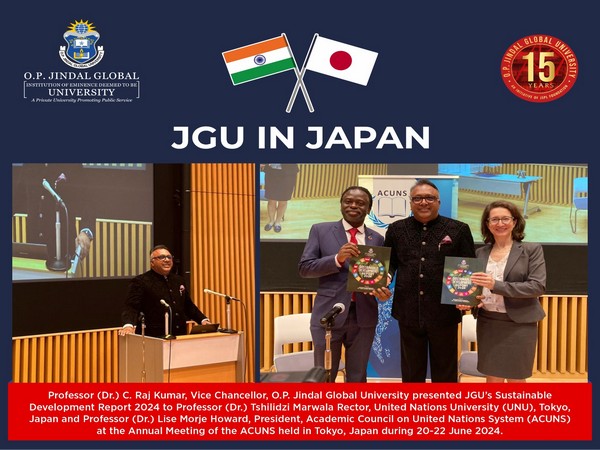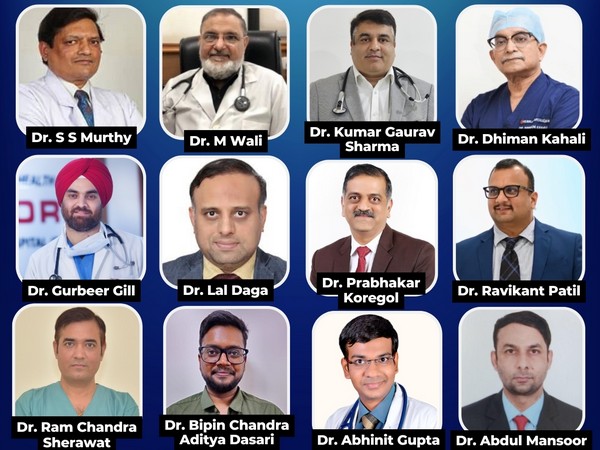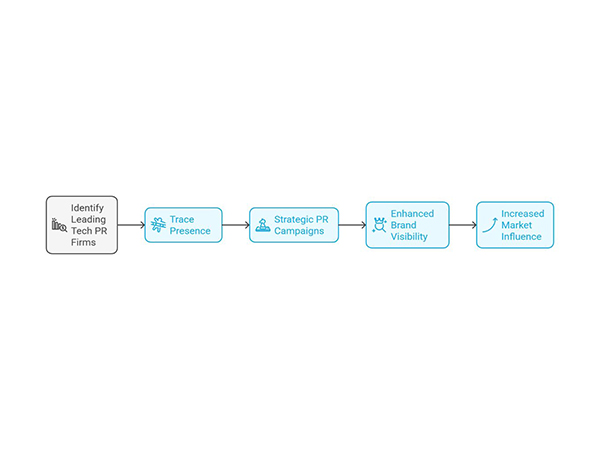Universities in Global South can be Changemakers to Achieve UN Sustainable Development Goals: JGU Vice Chancellor at Annual Meeting of the ACUNS in Tokyo
Jun 26, 2024

OP Jindal University
Tokyo [Japan], June 26: The Founding Vice Chancellor of O.P. Jindal Global University, Prof. (Dr.) C. Raj Kumar addressed the prestigious Annual Meeting of the Academic Council of the United Nations System (ACUNS) and delivered the keynote speech, titled "The Role of Universities in the Global South for Achieving the Sustainable Development Goals (SDGs)". In his landmark discourse, Dr. Raj Kumar outlined how critical it was to achieve the ambitious Agenda 2030 in the remaining six years and how important it is for all stakeholders, governments and corporations to undertake strategic policies and actions to contribute directly to the fulfilment of the SDGs and solve pressing global issues. "It is essential that knowledge production and distribution, innovation, cutting-edge research, interactive learning, capacity building are enhanced for human development and universities and other higher education institutions can be a key platform to realise the fruitful conclusion of these important and demanding tasks," he said.
Professor (Dr.) Kumar detailed the critical steps needed and said, "Universities in India and the Global South can contribute to the achievement of all the 17 SDGs in 10 main points. The primary role of universities is to empower students to become change-makers by embedding relevant themes and challenges within the curricula while focusing on experiential learning, clinical programmes, capstone projects, and community level engagement. To break the vicious cycle of poverty, it is essential to provide financial aid and scholarships, promote philanthropy, and provide policy recommendations to the government to invest in public education. To ensure equality for all, institutions have the dual responsibility to be microcosms of equal opportunity, fair practice, and an inclusive centre of learning as well as workplace. Universities contribute to achieving the goal of good health and well-being through generation of knowledge and scholarship on healthcare, and raising awareness through community engagement."
"Furthermore, to take action towards preservation of life on earth and climate change, universities should invest in research on environment and engage with indigenous cultures about sustainable practices, and act as change agents by reducing carbon footprint and creating sanctuaries within campuses for biodiversity preservation. Universities can nurture individual consciousness towards sustainability through curriculum, research agendas, sustainable infrastructure, campus engagement, public institutional engagement, and institutional environmental footprint. To work towards the goal of clean water and food security, universities must utilize their maximum potential to positively impact public policy, and improve water management and food security practices within their own premises. For sustainable economic growth of people and industries, universities need to design dynamic curriculum relevant to market changes, collaborate with industries, and act as incubators for innovation and entrepreneurship. To advocate for peace and justice, educational centres must uphold academic freedom and objectively portray diverse perspectives and truths without external interference or censorship to inculcate awareness within the social and political psyche of the people. To work towards partnership especially, South-South Cooperation, universities can create consortiums, research networks, address common challenges, promote cultural exchange, and influence policy change," Professor (Dr.) Kumar said.
The 2024 ACUNS Annual Meeting coincided with the release of the JGU Sustainable Development Report, a first of its kind comprehensive attempt to demonstrate how an university itself through its educational activities, research, management, opening jobs, providing equal opportunities in recruitment, establishing and maintaining health standards, delivery of public service, support for local communities, building gender awareness, adopting environmental protection policies both on campus and beyond and other sustainable activities can directly and effectively contribute to the achievement of various specific SDGs.
The JGU Sustainable Development Report was presented to the outgoing President of ACUNS Prof. Lise Howard of Georgetown University and to the incoming President Dr. Franz Baumann, to the two co-hosts of the 2024 ACUNS Annual Meeting - Prof. Tchilidzi Marwala, Rector of the United Nations University in Tokyo, and Prof. Atsuko Kawakita, Vice Dean of International Affairs, University of Tokyo and to tens of professors, researchers, activists and other participants at the 2024 ACUNS Annual Meeting.
O.P. Jindal Global University was represented by 15 faculty members from different schools at the ACUNS Annual Meeting who also presented their latest research in various panels. Prof. Dr. Vesselin Popovski, Vice Dean of Jindal Global Law School, current Chair of the ACUNS Best Dissertation Award Committee, presented the 2024 Best Dissertation Awards to the two winners Rebecca Yemo (University of Massachusetts) and Johannes Scherzinger (University of Zurich).
(ADVERTORIAL DISCLAIMER: The above press release has been provided by OP Jindal University. ANI will not be responsible in any way for the content of the same)









